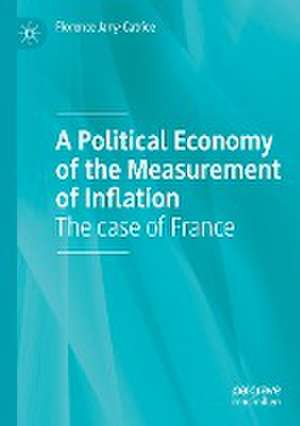A Political Economy of the Measurement of Inflation: The case of France
Autor Florence Jany-Catriceen Limba Engleză Paperback – 13 ian 2022
Inflation should no longer be a politically sensitive indicator. Indeed, since the early 1980s, macroeconomic policies have managed to contain it. Yet the consumer price index (CPI), which is the main indicator for measuring inflation, remains very frequently consulted by citizens, due to its multiple uses. The CPI is used for indexing wages, pensions, but also various contracts such as food pensions. It is also used by National Accounts to deflate macroeconomic values and to provide data in “real” terms. But how is this CPI measured? index? What reforms have happened to give shape to the XXIst century CPI?
| Toate formatele și edițiile | Preț | Express |
|---|---|---|
| Paperback (1) | 689.64 lei 6-8 săpt. | |
| Springer International Publishing – 13 ian 2022 | 689.64 lei 6-8 săpt. | |
| Hardback (1) | 694.22 lei 6-8 săpt. | |
| Springer International Publishing – 13 ian 2021 | 694.22 lei 6-8 săpt. |
Preț: 689.64 lei
Preț vechi: 811.34 lei
-15% Nou
Puncte Express: 1034
Preț estimativ în valută:
131.96€ • 137.79$ • 108.97£
131.96€ • 137.79$ • 108.97£
Carte tipărită la comandă
Livrare economică 15-29 aprilie
Preluare comenzi: 021 569.72.76
Specificații
ISBN-13: 9783030599423
ISBN-10: 3030599426
Ilustrații: XVII, 139 p. 13 illus.
Dimensiuni: 148 x 210 mm
Greutate: 0.22 kg
Ediția:1st ed. 2020
Editura: Springer International Publishing
Colecția Palgrave Macmillan
Locul publicării:Cham, Switzerland
ISBN-10: 3030599426
Ilustrații: XVII, 139 p. 13 illus.
Dimensiuni: 148 x 210 mm
Greutate: 0.22 kg
Ediția:1st ed. 2020
Editura: Springer International Publishing
Colecția Palgrave Macmillan
Locul publicării:Cham, Switzerland
Cuprins
Introduction.- 1.What is a Price Index - Statistical Approach.- 2. A Political Economy of the Price Index, 1913-1990.- 3. The European Turning Point.- 4. The Quality Effect.- 5. From Consumer Prices to the 'Cost of Living'.- 6. The Reform of “Checkout Data”.- 7. Under or Overestimation of Inflation?.- Conclusion.
Notă biografică
Florence Jany-Catrice is Full Professor of Economics at the University of Lille, France. She conducts her research at Clersé (Lille Center for Economic and Sociological Studies and Research) -UMR 8019 around the quality economy (work, employment, services, wealth) and its measures. Florence Jany-Catrice chairs the French association of political economy (AFEP). She is also visiting professor at Xi'An University, China and is Richard B. Fisher Member, School of Social Science (2020-21), Institute for Advanced Study, Princeton, USA.
Textul de pe ultima copertă
Inflation should no longer be a politically sensitive indicator. Indeed, since the early 1980s, macroeconomic policies have managed to contain it. Yet the consumer price index (CPI), which is the main indicator for measuring inflation, remains very frequently consulted by citizens, due to its multiple uses. The CPI is used for indexing wages, pensions, but also various contracts such as food pensions. It is also used by National Accounts to deflate macroeconomic values and to provide data in “real” terms. But how is this CPI measured? index? What reforms have happened to give shape to the XXIst century CPI?
This book presents the CPI based on the study of the controversies that have marked its history. Set in both the socio-economic and ideas contexts, these controversies show the eminently conventional and political nature of the CPI and, therefore, of many other macroeconomic indicators, such as growth or productivity.
Caracteristici
Analyses the internal conventions and the disputes that have surrounded the measurement and use of the French CPI in official statistics Gives a thorough account of the debates, experiments and hesitations that have punctuated the life of the price index Reveals in a very educational way the political stakes behind the measurement of inflation, whereas they are too often presented in the literature under its technical aspects Effectively shows all of the struggles and conflicts behind measurement issues throughout the 20th century Offers an effective demonstration of the fact that macroeconomic indicators are always socio-political conventions. It will appeal to researchers and citizens interested in the political issues of quantification
